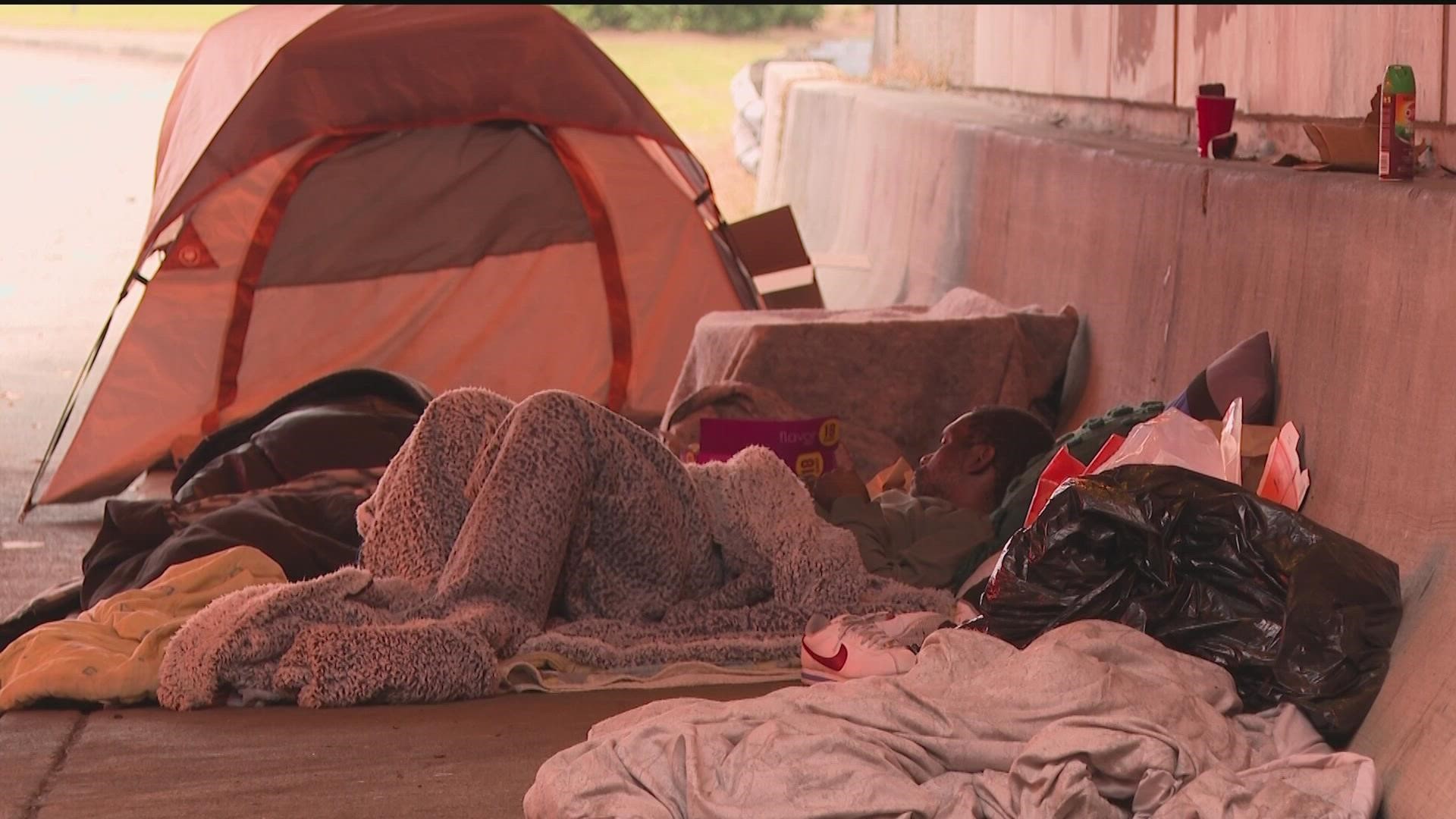ATLANTA — The number of people experiencing homelessness in Atlanta has dropped 38%, according to a statement made by the city's mayor. But that's not the perception.
11Alive went out into the community and even surveyed those in our newsroom about their thoughts on the causes of homelessness. Addiction, job loss, lack of support, mental health problems and personal choice all came up.
One man living on the streets, who asked not to be identified, described it as a lifestyle that's not easy to escape.
"It’s like sticky at the bottom and it kind of holds on to you.”
He described that stickiness, which for him is anxiety and depression triggered by a car wreck that killed his wife and daughter.
“If you just said, 'I don’t want to do this anymore,' what would be your first step?” investigative reporter Kristin Crowley asked him.
“Oh, I say that every morning,” the man quickly responded.
11Alive chose to explore the crisis in the community by working to identify the barriers that keep people from being housed, the issues those experiencing homeless may face and solutions that have been put into action - or ideas that could help.
Part 1: The Problem
Atlanta is on a mission to remove encampments. The city pledged more than $26 million for its Lift 2.0 initiative to house 1,500 people living on the streets by next December.
Every two years, cities count their homeless population. In Atlanta, of the 2,017 homeless counted in 2022, the majority were adult, Black men. More than a third, 37%, reported a serious mental illness. Thirty-two percent reported a substance use disorder and 20% were veterans.
But only a third of those counted were actually living on the streets, an indication the tents we see are a symptom of something else - chronic homelessness.
“I think chronic homelessness is the revolving door of lacking any stability in your life,” explained Ike Reighard, the CEO of MUST Ministries, a shelter in Cobb County that also offers food, clothing and job placement assistance.
Reighard said that instability makes those living in encampments the most visible and complicated population to reach. They have often created a new sense of community with those living in tents nearby and don't believe stability in another environment is possible.
But then there are those experiencing homelessness that you don't see - and the efforts to help them find their way home.
Read the full piece: 'It's sticky at the bottom' | Man living on the street explains why it's so hard to end homelessness
Part 2: The Causes
There are a few main causes that can keep people out of a home.
Lack of formal identification, affordable housing, voucher acceptance and shelter policies are all factors that came up the most often.
Every year the state counts the number of people experiencing homelessness and the programs designed to help. In January, only 57% of the shelter beds in Atlanta were being used. But shelters said in the past two months, that’s changed, and most are now full night after night. They each have their own rules, though, and aren't necessarily open to everyone.
When it comes to Section 8, the waitlists are long for the federal government. The program, which pays the primary share of the rent for those who are approved, helps those that are very low-income, elderly or disabled find stable housing.
But there is one thing that people need to get ahead: An ID.
“You need it for any housing,” said Leni Garner, who works for the Policing Alternatives and Diversion Initiative or PAD as a care navigator.
It’s not just housing -- IDs are needed to get a job, a bank account, and a car. PAD said about 700 of the homeless people it serves don’t have an ID. That’s 700 people who can’t work and can’t get back on their feet.
“It’s so hard to navigate that system if you lost everything and you’re starting from scratch,” said Garner.
Here's what people have to go through to get an ID or get into a shelter.
Read the full piece: 'It's just really frustrating' | Groups explain barriers that keep people out of permanent housing
Part 3: The Solutions
Finding permanent solutions for people without homes has been a struggle locally and nationwide. And through different programs and willing people, some resolutions are coming about.
In Athens, they have a government-sanctioned encampment. It is a fenced-in, security-enforced area with bathrooms, food, recreational activities and dozens of tents. The tents are meant to give people without homes a safe place to live temporarily; the key word is “temporarily.”
“We are first step, alternative housing community, which means that we’re not housing anyone to keep them homeless,” said Tershant Smith, the project director.
Not every outreach mission to help people experiencing homelessness is through the government. Many organizations and foundations are born of people who just want to support and from some who know what it's like to not have a place to lay their head.
Tracy Thompson believes that even those who are experiencing chronic homelessness can find the way home because she's been in their shoes and is willing to help. Every weekend Thompson comes to the back corner of an apartment complex near Cheshire Bridge Road. She, with a team of volunteers, pass out clothes, food and toiletries to people that are homeless and living nearby.
Though there are people like Thompson, these personal grassroots efforts help but may not be enough. There is a price tag involved.
The path to more homes needs to be paved with cash - and this nonprofit is building more homes and is putting money aside to make it happen. Will it be enough?
Read the full piece: 'I didn't want to die' | People, organizations, cities work to help people find housing
Watch the series in the playlist below.

